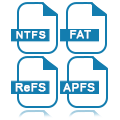- R-STUDIO
- Help & Manual
Empowered by the new unique data recovery technologies, R-STUDIO is the most comprehensive data recovery solution for recovery files from NTFS, NTFS5, ReFS, FAT12/16/32, exFAT, HFS/HFS+ and APFS (Macintosh), XFS, Little and Big Endian variants of UFS1/UFS2 (FreeBSD/OpenBSD/NetBSD/Solaris) and Ext2/Ext3/Ext4 FS (Linux) partitions. It also uses raw file recovery (scan for known file types) for heavily damaged or unknown file systems. It functions on local and network disks, even if such partitions are formatted, damaged or deleted. Flexible parameter settings give you absolute control over data recovery.
For professional Data Recovery Services, we offer R-Studio Technician.

| Download page | |
|
from
$49.99
| Buy online |









FAT12, FAT16, FAT32, exFAT, NTFS, NTFS5, ReFS / ReFS2+ / ReFS 3.4/3.7/3.10 (Resilient File System, Windows 2012/2016/2019/2022 Server), HFS/HFS+ and APFS (including encryption) (Macintosh), Little and Big Endian variants of UFS1/UFS2 (FreeBSD/OpenBSD/NetBSD/Solaris) and Ext2/Ext3/Ext4 FS (Linux), XFS, ISO9660 (CDs/DVDs/Images), UStar/Tar/CPIO/Pax* (Tape drives).
* R-Studio Technician versions only
An advanced RAID reconstruction module.
If the OS cannot recognize your RAID, you can create a virtual RAID from its components. Such virtual RAID can be processed like a real one. Standard RAID levels supported: 0, 1, 4, 5, 6. Nested and non-standard RAID level supported: 10(1+0), 1E, 5E, 5EE, 6E. Support for parity delays in all applicable levels. Support for customer-specified RAID layouts.
Automatic RAID parameter recognition. R-Studio can recognize all RAID parameters for RAID 5 and 6. This feature helps the user to solve one of the most difficult problems in RAID recovery.
Files can be recovered on network computers running Win2000/XP/2003/Vista/2008/Windows 7/8/8.1/10/11/Windows Server 2012/2016/2019/2022, Macintosh, Linux, and UNIX.
Recovered files can be saved on any (including network) disks accessible by the host operating system. Recovered files may be saved on a disk on a connected remote computer rather than be transferred over network to the local one.
All R-Studio versions create IMAGE FILES for an entire Hard Disk, Partition or its part. Such image files can be compressed and split into several files to put it on CD/DVD/flash or FAT16/FAT32/exFAT. Then the image files can be processed like regular disks.
The advanced multi-pass disk imaging algorithm with variable parameters and runtime imaging added to R-Studio Technician make it the ideal complete solution for creating a professional data recovery workstation.
All versions of R-Studio can create images in the rdr file format(native for R-TT products), including its encryption, and load VMDK/VHD/VHDX/VDI files, R-Studio Corporate and Technician/T80+ versions can create them.
R-Studio Emergency (32/64 bit) version is run from a USB stick or compact disc when it is necessary to recover data on a computer, on which Windows cannot start up because its system files are corrupted or deleted.
R-Studio Emergency can be based either on Linux or Windows PE.
* R-Studio Emergency is included in R-Studio package but its activation key is generated separately and requires a hardware code obtaining. The activation key can be requested through our Client Portal within one year from the date of purchase.
-
R-Studio utilities recover files:
- Deleted without Recycle Bin, or when Recycle Bin has been emptied;
- Removed by virus attack or power failure;
- After the partition with the files was reformatted, even for different file system;
- Recovering data if: VIRUS has invaded; FAT is damaged; MBR is destroyed; FDISK or other disk utilities have been run;
- When the partition structure on a hard disk was changed or damaged;
- Data recovery on damaged or deleted partitions;
- From hard disk with bad sectors;
-
Support for:
- Basic(MBR), GPT, BSD(UNIX), APM(Apple partition map) partitions layout schemes;
- Support for Bitlocker Drive Encryption, both for BitLocker Drive Encryption and BitLocker ToGo volumes;
- Dynamic volumes, Windows Storage Spaces (Windows 2000-2022/8.1/10/11);
- Apple software RAIDs, CoreStorage, File Vault, and Fusion Drive;
- Linux Logical Volume Manager (LVM/LVM2) and mdadm RAIDs;
- Intel Software RAIDs;
R-Studio can automatically recognize and assemble the components of these disk managers even if their databases are slightly damaged. Their components with severe corrupted databases can be added manually.- Support for VMDK/VHD/VHDX/VDI file formats. Read-only for all versions, creation for Technician/T80+ versions.
- Read-only support for dmg files (Apple Disk Image: all versions ), E01/(EWF) files (Expert Witness File Format: R-Studio Technician/T80+), and AFF files (Advanced Forensic Format: R-Studio Technician/T80+).
-
Advanced data recovery algorithm:
- to increase the quality of file recovery when the file system is not damaged;
- to recover files that are not recognized in file system metadata and not found during a disk scanning procedure;
- to fast search for lost partitions;
- to recover files from devices with unknown file systems, including HD, CD, DVD, floppy disk, Compact-Flash Card, USB drive, ZIP drive, Memory Sticks and other removable media.
-
Support for specific file system features:
- Recognitions of localized names;
- NTFS encrypted files, NTFS alternative data streams, NTFS data deduplication, NTFS LogFile, NTFS Symbolic Links & Directory Junctions;
- ReFS: symbolic links, directory junctions, deduplication;
- HFS+ journal processing, HFS+ extended attributes, HFS+ compressed files;
- Advanced APFS recovery: support for encryption;
- Ext2/Ext3/Ext4 FS/UFS journal processing and extended attributes;
- XFS extended attributes;
- Recovery of names and paths for files deleted to Recycle Bin and Trash.
-
In-depth file analysis:
- Extended file search and mask capabilities;
- Estimation of chances for successful file recovery;
- Verbose file information. Even more extensive file information in the Technician version: specific file system info, overlapping files, disk regions, etc;
- File recovery lists for mass file recovery. File recovery lists with extensive file information in the Technician version.
- Multitasking: Several different tasks can be performed simultaneously in R-Studio Technician/T80+. For example, you can create a multi-pass image using a third-party hardware, scan a disk image, and recover files from another image, all at the same time. The number of concurrently performed tasks depends only on the computer efficiency (CPU, RAM, HDD/SSD, etc). Each task runs in its own tab and can be controlled individually. Computer shutdown takes place when all tasks are completed. The list of running tasks is displayed on the Main panel in the lower left corner.
-
User Interface:
- Standard Windows Explorer style with support for dark themes;
- Multi-language User Interface: English, French, Spanish, German, Russian, Portuguese, Traditional and Simplified Chinese, and Japanese;
- Hidden devices: Devices that are not subject to scanning for data recovery can be hidden from the Main panel (System disks, devices for storing data, etc). Such hidden devices are still accessible for storing recovered files, logs, scan info, etc.
-
Integration with DeepSpar Hardware:
- DeepSpar Disk Imager, a professional HDD imaging device specifically built for data recovery from hard drives with hardware issues. Such integration provides R-Studio with a low-level fine-tuned access to drives with a certain level of hardware malfunction. Moreover, it allows disk imaging and analyzing be performed simultaneously. That is, any sector R-Studio accesses on the source disk will be immediately cloned to a clone disk and any other data recovery operation will be made from that clone disk avoiding further deterioration of the source disk and great reduction in processing time.
- USB Stabilizer for quick and reliable work with unstable and degraded USB storage devices. It provides seamless hardware instability handling, ultimately mitigating common issues like freezes and crashes, and it automatically re-initializes a drive whenever its stuck reading a bad sector.
- RapidSpar is a data recovery hardware for extracting data from problematic hard drives. A failing hard drive (the source) and a healthy hard drive (the target) are connected to the device and it autonomously copies data from the source to the target to maximize the amount of successfully extracted data and minimize possible damage to the source drive. R-Studio can control this process reading and cloning only those disk areas that contain the necessary files and folders to decrease time required for data recovery.
- Data Recovery Guide
- Why R-Studio?
- R-Studio for Forensic and Data Recovery Business
- R-STUDIO Review on TopTenReviews
- File Recovery Specifics for SSD devices
- How to recover data from NVMe devices
- Predicting Success of Common Data Recovery Cases
- Recovery of Overwritten Data
- Emergency File Recovery Using R-Studio Emergency
- RAID Recovery Presentation
- R-Studio: Data recovery from a non-functional computer
- File Recovery from a Computer that Won't Boot
- Clone Disks Before File Recovery
- HD Video Recovery from SD cards
- File Recovery from an Unbootable Mac Computer
- The best way to recover files from a Mac system disk
- Data Recovery from an Encrypted Linux Disk after a System Crash
- Data Recovery from Apple Disk Images (.DMG files)
- File Recovery after Re-installing Windows
- R-Studio: Data Recovery over Network
- How To Use R-Studio Corporate Package
- Data Recovery from a Re-Formatted NTFS Disk
- Data Recovery from an ReFS disk
- Data Recovery from a Re-Formatted exFAT/FAT Disk
- Data Recovery from an Erased HFS Disk
- Data Recovery from an Erased APFS Disk
- Data Recovery from a Re-Formatted Ext2/3/4FS Disk
- Data Recovery from an XFS Disk
- Data Recovery from a Simple NAS
- How to connect virtual RAID and LVM/LDM volumes to the operating system
- Specifics of File Recovery After a Quick Format
- Data Recovery After Partition Manager Crash
- File Recovery vs. File Repair
- Data Recovery from Virtual Machines
- How to Connect Disks to a Computer
- Emergency Data Recovery over Network
- Data Recovery over the Internet
- Creating a Custom Known File Type for R-Studio
- Finding RAID parameters
- Recovering Partitions on a Damaged Disk
- NAT and Firewall Traversal for Remote Data Recovery
- Data Recovery from an External Disk with a Damaged File System
- File Recovery Basics
- Default Parameters of Software Stripe Sets (RAID 0) in Mac OS X
- Data Recovery from Virtual Hard Disk (VHD/VHDX) Files
- Data Recovery from Various File Container Formats and Encrypted Disks
- Automatic RAID Parameter Detection
- IntelligentScan Data Recovery Technology
- Multi-pass imaging in R-Studio
- Runtime Imaging in R-Studio
- Linear Imaging vs Runtime Imaging vs Multi-Pass Imaging
- USB Stabilizer Tech for unstable USB devices
- Joint work of R-Studio and PC-3000 UDMA hardware
- Joint work of R-Studio and HDDSuperClone
- R-Studio T80+ - A Professional Data Recovery and Forensic Solution for Small Business and Individuals Just for 1 USD/day
- Backup Articles
- R-Drive Image Standalone and Corporate license transferring
- Backup with Confidence
- R-Drive Image as a free powerful partition manager
- Computer Recovery and System Restore
- Disk Cloning and Mass System Deployment
- Accessing Individual Files or Folders on a Backed Up Disk Image
- Creating a Data Consistent, Space Efficient Data Backup Plan for a Small Business Server
- How to Move the Already Installed Windows from an Old HDD to a New SSD Device and Create a Hybrid Data Storage System
- How to Move an Installed Windows to a Larger Disk
- How to Move a BitLocker-Encrypted System Disk to a New Storage Device
- How to backup and restore disks on Linux and Mac computers using R-Drive Image
- Undelete Articles
- Get Deleted Files Back
- Free Recovery from SD and Memory cards
- R-Undelete: Video Recovery
- Recovery from an External Device with a Damaged File System
- File recovery from a non-functional computer
- Free File Recovery from an Android Phone Memory Card
- Free Photo and Video File Recovery Tutorial
- Easy file recovery in three steps
Rating: 4.8 / 5
R-TT may not be the easiest or most user-friendly solution, but the algorithm used for the renaming saved me THOUSAND of hours of opening ...
Bought it and 100% recommend it for anyone with a similar issue.
I was reluctant as it seemed pricey compared to other programs, but damn worth every penny. It managed to even find files I thought were wiped from existence.
Kudos to r-tools, thank you!
I`m an IT professional who has worked from home for over a decade. Early on in my career, I configured an HP ProLiant Server (Raid 1+0) as a workstation that I would remote into from my laptop. As technology evolved, I began to use it only for email and as a config file repository.
A short while ago, one of the drives degraded, but the HP ProLiant Server (Raid 1+0) still functioned fine on the remaining drive. I was complacent and didn`t replace the ...





